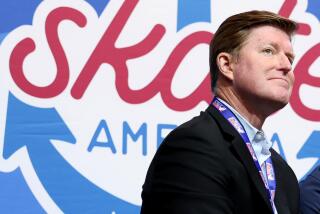BICYCLING : Flyers’ Teamwork Goes On When the Race Is Over : An amateur racing club consists of good students who are learning something about self-discipline.
- Share via
If you don’t follow bicycle racing--and let’s face it, few of us do--chances are you don’t know anything about the La Habra Flyers.
The Flyers are an amateur racing club that just happens to do very well. There are 21 kids on the team, most of them either 15 or 16, who have built a reputation as a power on the local racing circuit.
They also are getting good at winning medals in the national junior championships, the most prestigious competition for young riders.
And that’s only part of the story.
What makes this club different from a lot of others is what goes on when these young men and women are not racing. They happen to be good students--all of them--who are learning something about teamwork, self-discipline, moral values and the importance of education. For the Flyers, racing is just part of the program.
Largely responsible for all this is Dick Guthrie, a low-key 43-year-old native Virginian who has devoted most of his adult life to helping youngsters sort through those difficult teen years and emerge with some sense of what it takes to succeed in this world.
What Guthrie has done with the Flyers racing team defies the norm in sports.
While certainly it is the love of cycling and the competition that attract youngsters to the Flyers, Guthrie has expanded on them to create a program that emphasizes education, career and personal development as much as winning the 30-kilometer time trial.
Consider this: to race with the Flyers, the kids are required to maintain at least a C average in school. If they fall behind in their studies, the team provides them with individual tutors.
Team members travel to races as a group, eat together and contribute to race strategy. There are team banquets and outings and skull sessions to resolve differences. Parents are intimately involved in the team programs and races. And unlike a lot of other amateur and professional cycling teams that are built around one or two strong riders, the Flyers choose to emphasize the concept of teamwork and cooperation.
For his part, Guthrie seems embarrassed by all the praise that the racers and their parents give him. He says it’s just natural that any team sport go beyond the obvious competitive challenges of the sport itself and zero in on individual development of the competitor.
Guthrie credits the parents who have been involved from the start, but he saves most of his praise for the youngsters who ride for the Flyers.
“Cycling is unique in what it demands of these young people,” said Guthrie, who spent 22 years with the Boys and Girls Club, including the one in La Habra, and is now an administrator with the city La Mirada.
“When you are racing twice a week and training 300 miles a week, and you have to stay in shape by getting rest and eating right, there isn’t a whole lot of opportunity to get in trouble. Cycling is different from other sports in that you have to train year-round.
“It takes a special type of individual. We get a lot of kids who come in and say they want to be on the team, but they don’t have a real understanding of the intense time and effort and dedication of what it takes. The kids have to rely on themselves and their teammates.
“There are many situations in cycling where it teaches a real skill of understanding yourself as a person--the willingness to get up each and every day to train, even though you are exhausted, the self-discipline it teaches. All this is a great learning tool. It teaches skills for living, time management, and it teaches you not to fold the first time it hurts.”
Guthrie’s commitment to youth began after he graduated from Old Dominion University and went to work at a Boys’ Club in Richmond, Va. He spent the next 22 years working for the organization, finally leaving as director of the Boys and Girls Club in La Habra last year.
It was while in La Habra six years ago that he and a group of youngsters went for a simple bike ride. The Flyers bicycle touring club was soon organized and two years later, they were racing. Since then the team has been getting progressively better and more competitive.
By the end of the 1990 racing season, team members had won five California-Nevada district championships and a silver and two bronze medals in the Junior National Championships.
Yet through it all, the sense that there is something larger than the sport itself has remained an integral part of the Flyers organization.
“The riders really keep each other in check,” said Andy Velebio, a senior at Whittier High and a Flyers junior elite racer. “Like schoolwork. We know when someone is not doing well in their grades. We’ll say, ‘Hey, you need some help.’ There is some peer pressure to keep each other in tune. We are one of the few junior teams that shares everything. You learn to sacrifice your own personal gain for someone else.”
Added Josh Webster, another junior racer, “The difference with us is that we will sacrifice for each other. A lot of other teams don’t do that. We race for each other as much as we race for ourselves. But it’s not only that. They want you to do well in other areas of life too.”
Stan Bartilet, a team sponsor and owner of the Bike Builders cycle shop in Whittier, is unequivocal in attributing much of the team’s success to Guthrie, who volunteers his time to the club.
“I found out very quickly that Dick was more dedicated to building kids than bicycle racers,” said Bartilet, whose son and daughter race for the Flyers. “He wants to build good citizens, keep them out of trouble.
“Dick talks to these guys. I’ve probably had 10 phone calls today, people asking for Dick. He is absolutely terrific. He has dedicated so much of his life to these kids. He has a way about him that he is able to communicate. He can change conversation five times in five minutes, going from a kid who is in trouble, to a kid who just needs some information, to an adult.”
Guthrie, he said, is the calm, steady voice that has helped to keep the sport in perspective for young cyclists who might be quick to forget everything else.
“There have always been a lot of dumb cyclists,” he said. “I don’t want that and neither does Dick. At a young age, as a junior, it is easy for them to do nothing but cycling. You have to remind them that there is more to life, like school and yardwork and other things. Dick is good about getting the kids back on track. He knows how to talk to them.”
Guthrie views cycling as an ideal vehicle to teach young adults some of the skills that will serve them well in their later years.
“The level that young people are committed to is unique to any sport,” Guthrie said. “These are kids who stay at this year-round. They are responsible for the upkeep of their equipment and their body in a sport that is not widely understood or appreciated in the United States. In Europe these kids would be heroes. People would be honking and waving at them as they drive down the road. Here, people try to run you off the road.
“A big part of it is a maturing process,” he added. “We set this up with objectives that went beyond successful cycling. One goal was to give these young people skills for living, to give them a framework for a successful life. That’s what sets this team apart. It teaches lifelong physical fitness skills, and to be successful at what they do.
“We have kids who may or may not become world beaters as far as winning every race, but . . . you sit here and just watch the kids grow. You can see the relationships that the kids foster with one other, watching them set goals and achieve goals, both in cycling and in life.
“The glory they achieve, and strive for, is for themselves and for the sport they love.”
More to Read
Sign up for The Wild
We’ll help you find the best places to hike, bike and run, as well as the perfect silent spots for meditation and yoga.
You may occasionally receive promotional content from the Los Angeles Times.






